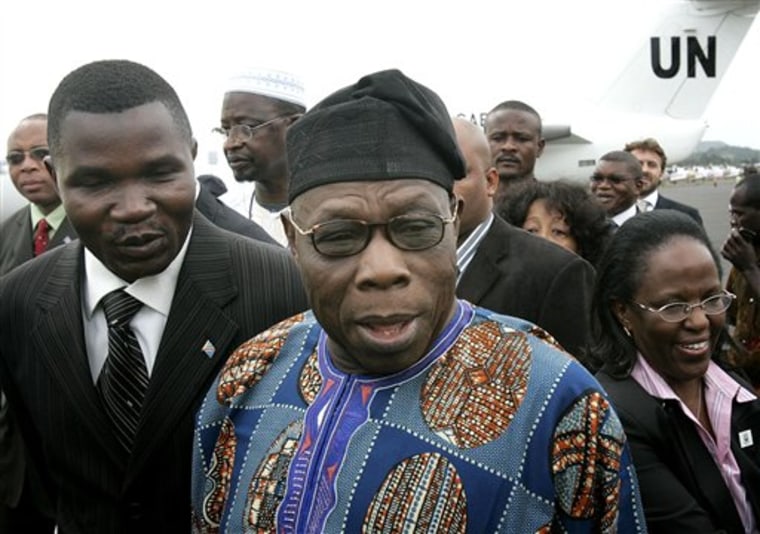The U.N. special envoy to Congo met with the Central African country's main rebel leader Sunday for the first time, pressing to firmly establish a cease-fire even as the U.N. reported more heavy fighting in the east.
The visit by former Nigerian President Olusegun Obasanjo came after he talked to Congo's president and the president of neighboring Angola in recent days, trying to get a resolution to Congo's political crisis.
Obasanjo flew Sunday by helicopter to the rebel-held town of Jomba, near the Ugandan border, and was greeted with a hug by gray-suited rebel leader Laurent Nkunda. After a two-hour meeting in a church compound, Obasanjo said the rebel leader agreed to maintain a fragile cease-fire.
"(But) cease-fire maintenance is like dancing tango. One does not dance tango alone," Obasanjo noted.
Support needed from Congo's government
Nkunda said the Congolese government had to support the cease-fire as well. He described his talks with Obasanjo as "exploratory" and lauded the envoy's involvement as "great."
Shortly afterward Obasanjo left for the regional capital, Goma. The U.N. envoy was due in Rwanda later Sunday for talks with that country's president, Paul Kagame, who wields strong influence over Nkunda.
Nkunda, a former general, quit Congo's army in 2004 and launched a rebellion he claims is aimed at protecting ethnic Tutsis from Hutu militias who fled to Congo after Rwanda's 1994 genocide that left more than 500,000 mostly Tutsis dead. Critics, however, say Nkunda is more interested in power and the country's mineral wealth.
Ahead of the talks, clashes broke out in Ndeko, about 55 miles (90 kilometers) north of Goma, according Col. Jean-Paul Dietrich, a spokesman for the 17,000-strong peacekeeping mission.
Dietrich described the Sunday morning battle between government soldiers and rebels as "heavy" and said six army troops were wounded.
"We gave them first aid and we will evacuate them by helicopter" to a local hospital, Dietrich said.
Violence escalated in August
Low-level fighting among armed groups has ground on for years in Congo's lawless North Kivu province, but violence sharply escalated in August and has since displaced 250,000 people.
On Saturday, Obasanjo said Congo President Joseph Kabila was willing to talk to Nkunda and "did not give anything that I would call conditions" for holding talks.
"But we are at the exploratory stage now," he admitted.
Congo's government has said it is willing to meet Nkunda, but only along with the many other militias operating in the region — not alone. Nkunda has criticized the government for signing deals with Chinese companies to exploit the nation's mineral wealth.
On Friday, Obasanjo visited Angola to speak with President Jose Eduardo Dos Santos, who assured him that no Angolan troops were in Congo despite numerous reports to the contrary.
Congo has called on Angola for military help, and some fear the current crisis could once again draw in other neighboring countries. Congo's devastating 1998-2002 war split the vast nation into rival fiefdoms and involved half a dozen African armies, including Angola's.
